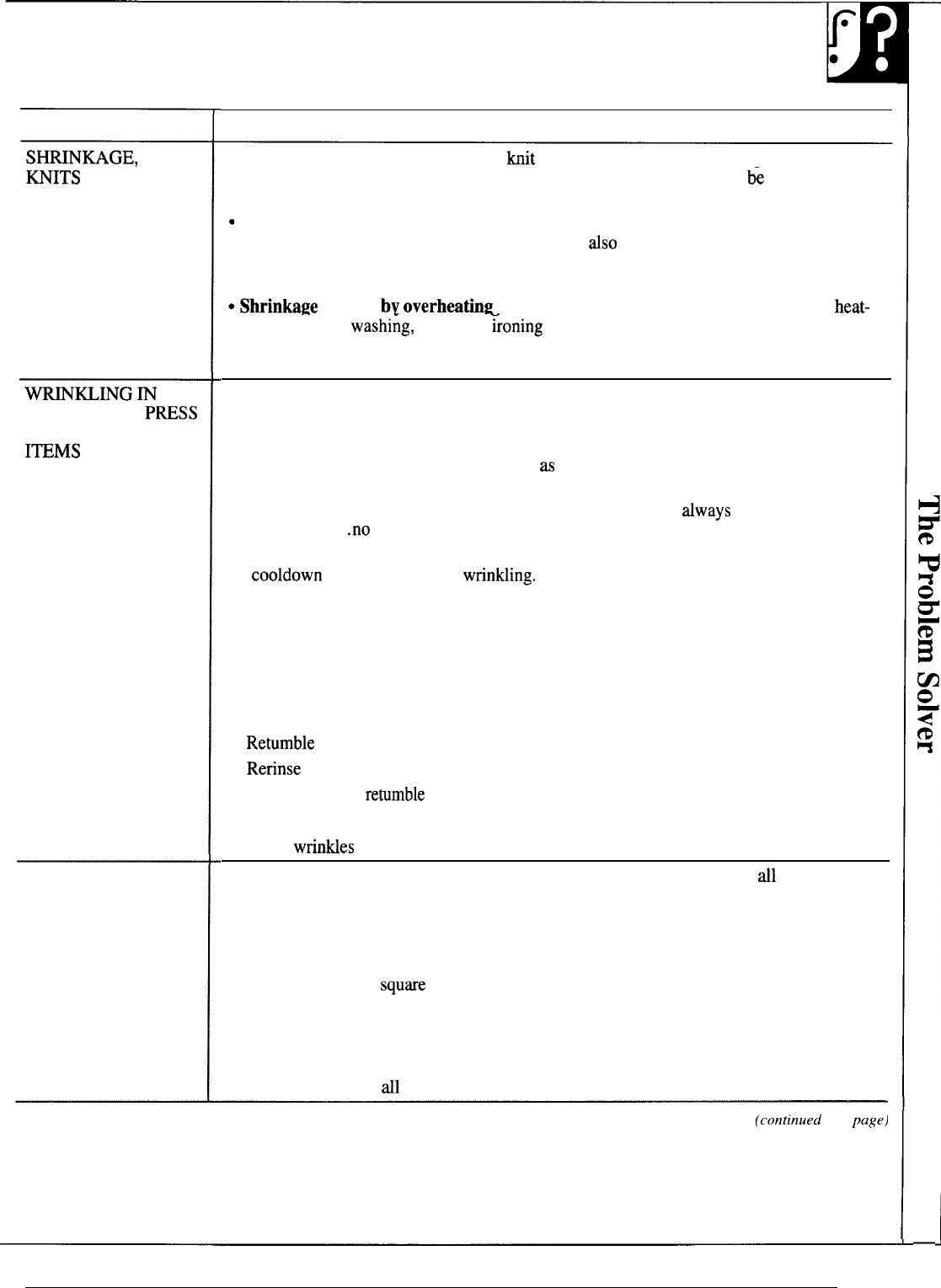
PROBLEM
SHNN~GE,
~ITS
WN~ING
~
PERMANENT
PWSS
AND “NO-IRON”
I~MS
POSSIBLE CAUSE
●
Relaxation shrinkage can
occur in
knit
fabrics that have been improperly stretched
and elongated by the manufacturer. When this occurs, garment may
~
pressed back
into shape after each wash and dry cycle.
Progressive or delayed shrinkage is caused
when starch or sizing (in some fabrics)
is gradually removed by laundering. This may
dso
be noticed in older garments that
have been washed many times without previous shrinkage. Treat as for relaxation
shrinkage above.
Shrinkage
caused
bv
overheating
occurs in certain knit fabrics that have been
heat-
shaped. When
washi~g,
drying or
ironing
temperatures exceed the temperatures used
to shape set, shrinkage may occur. This cannot be corrected, but it can be prevented
by washing in cool or warm water and drying on low or delicate heat.
●
Leaving clothes in dryer after tumbling stops. Remove and hang clothes immediately.
●
Too many clothes in dryer. Dry only one washer load at a time. Do not combine loads.
●
Improper loads. Avoid laundering heavy permanent press items, such as work clothes,
with lighter permanent press items such
as
shirts or blouses. Do not wash permanent
press items with regular laundry.
●
Too many clothes in washer. Permanent press loads should
rdways
be smaller than
regular loads..
.no
more than medium loads to give clothes room to move freely.
●
Incorrect wash and dry cycles. Use Permanent Press Wash cycle which provides
a
cooldown
rinse to minimize
wrin~ing.
Also use Permanent Press Dry cycle.
●
Incorrect water level. Use larger water level for medium load, medium level for
small load.
●
Repeated washing in too hot water. Wash in cold or warm water with plenty of
detergent.
●
Failure to use fabric softener. Proper use will minimize wrinkling.
To
remove wrinkles:
●
Retumble
on Permanent Press setting in your dryer.
●
Rerinse
and dry on Permanent Press setting.
●
If unsuccessful,
retumble
on high heat for 10 to 12 minutes and hang immediately.
●
Send to dry cleaners for pressing.
●
Some wrin~es may remain which cannot be removed.
●
Pins on garments or sharp objects left in pockets, Check to make sure
dl
such objects
are removed. Also check wash tub.
●
Snaps, hooks, sharp buttons, belt buckles, zippers. Fasten hooks, zippers and buttons.
Remove sharp buttons and belt buckles. This is especially important in washing knits
which snag easily. Turn knits inside out.
●
Holes with random
quare
shapes with yellow discoloration may be caused by
improper use of chlorine bleach. Use only correct amount of bleach. See Other
Laundry Products section. Never add undiluted bleach to wash tub or allow clothes
to come into contact with undiluted bleach. Do not wipe up bleach spills with clothes.
●
Small, unnoticed tears may enlarge during washing process. Check garments before
washing and mend
dl
rips and tears.
SNAGS, HOLES,
TEARS, RIPS OR
EXCESSIVE WEAR
(C[]ntinued
next puge)
17


















